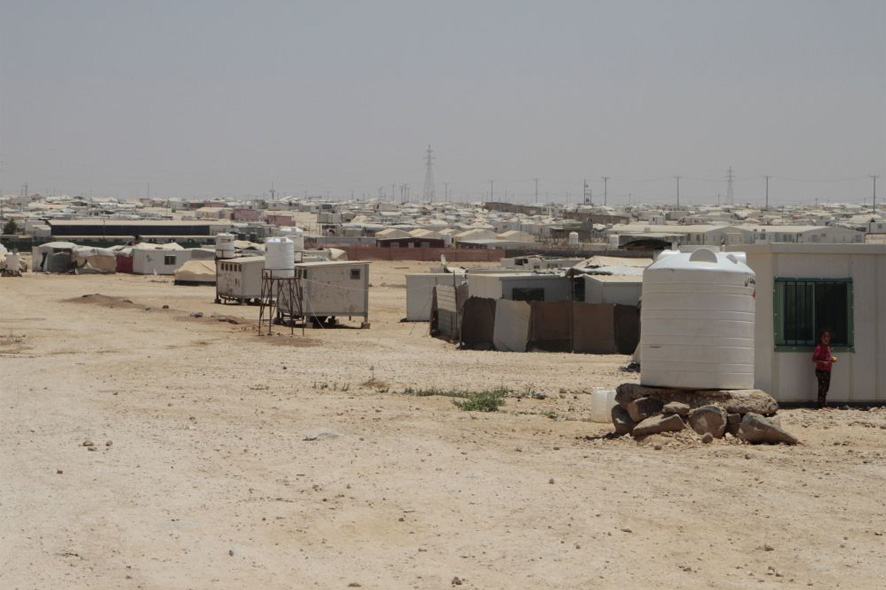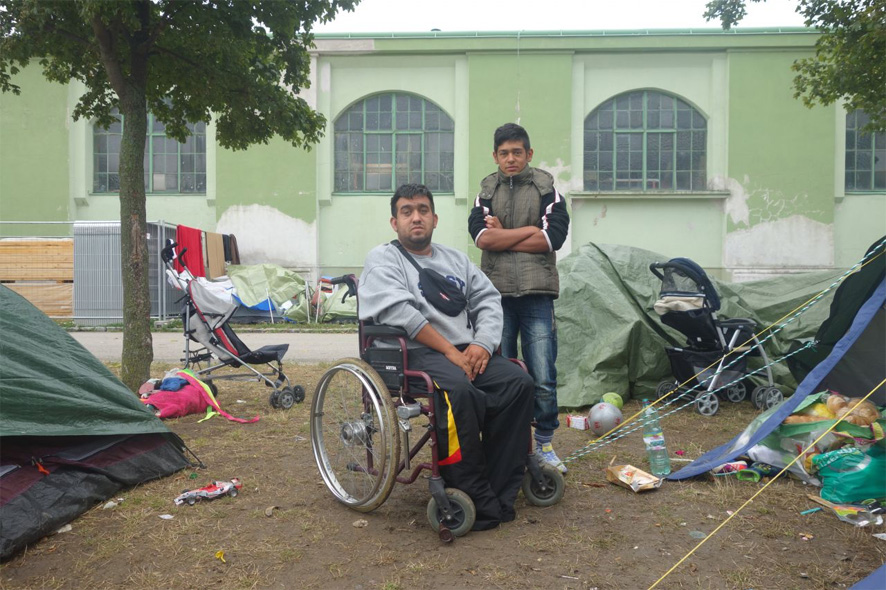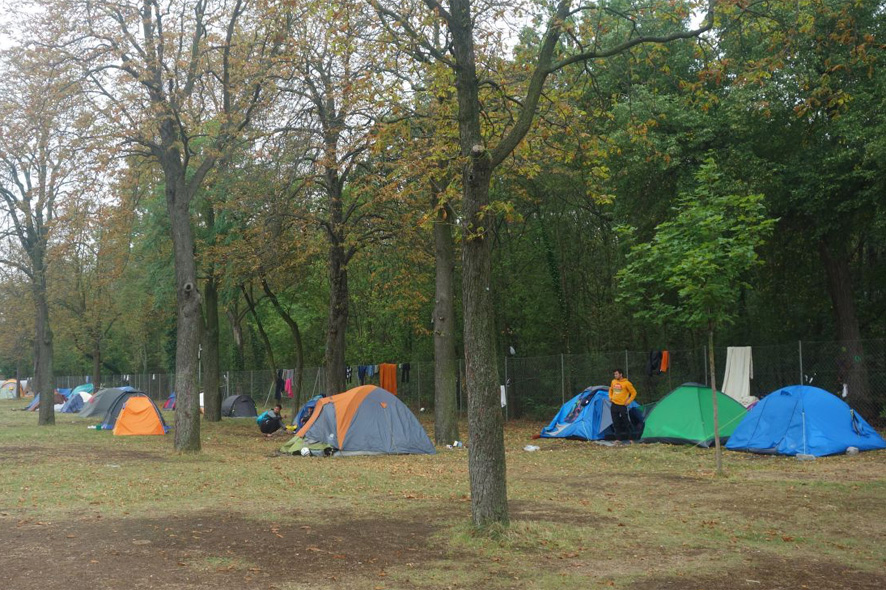Journalist Simon Hadler’s fact-checks regularly provide readers of ORF.at with insightful reportage on the subject of refugees and asylum-seekers. In doing so, he dispels the myths and prejudices being bandied about in this debate. At the next Deep Space LIVE on Thursday, April 14th in the Ars Electronica Center Linz (admission: €3 or a valid museum ticket), the prizewinning reporter will focus on some of the essential issues raised by that public debate and do it together with someone who’s experienced this first-hand—a 20-year-old refugee from Syria. Just back from a fact-finding mission in the field, Simon Hadler took some time out to answer a few of our questions.
Isn’t the problem with all the debates conducted in the public sphere about a “flood of refugees” essentially a linguistic one, how we talk about this subject, and a conceptual one, the idea that this “flow” can be regulated like a swollen stream?
Simon Hadler: That was Phase 1: the dehumanization of human beings. And language is an important means of bringing this about. “Torrent,” “flood,” “onslaught”—all of these words bring natural catastrophes to mind. Refugees thus exist only as an abstract mass, in dry-as-dust statistics or as vague images of bogeymen. But then, an increasing number of images began to be juxtaposed to these: pictures of children, women and men like those in Idomeni. These are human beings, and, what’s more, people obviously in distress. But prefab responses were provided even to this. Foreign Minister Sebastian Kurz put it this way on Anne Will’s talk show: “The images are terrible, but we shouldn’t make the mistake of believing that this can take place without images like these.” That means: when dehumanization doesn’t work anymore, you have to segue into numbness. The watchwords: These are, indeed, images of people’s suffering, but if we don’t want a portion of our national budget to be spent on mitigating this distress, then we’re just going to have to get used to images of people suffering. Otherwise, we might not be able to finance the next tax reform. Care to take one fewer day of vacation? If not, then get accustomed to pictures of human plight. This is a decisive step, one that goes far beyond rhetoric: We’re no longer disputing the fact that people are suffering; we’re resigning ourselves to it. Egotism as a political magnitude is thus made officially respectable.
Many Austrians won’t feel that this “concerns” them until the governmental measures taken in response to the “refugee crisis” have an impact on their own cross-border holiday planning. Do we Europeans lack empathy; are we incapable of a “face-swap” with the victims?
Simon Hadler: There’s a lack of this, and not only in the so-called refugee crisis. The causes of this seem to differ from country to country. If you just apply a bit of common-sense psychology, it’s not difficult to see why former Warsaw Pact member states don’t want any refugees. Solidarity has gone out of fashion there and the virtue of sharing has become outdated in these difficult economic times. But in Austria too, the real earnings of the bottom 15% of the income pyramid has dropped markedly over the past 15-20 years. Nevertheless, attributing the blame for this to aid recipients and asylum-seekers is due to political propaganda. People want simple answers. From a historical perspective, empathy is most difficult to get across when “the others” are perceived as especially foreign—consider, for example, the so-called barbarians of Antiquity. The “barbarians” were always “the others,” and you can see what that led to even before considering the events of the 20th century. The Enlightenment as an ongoing project has been working to counteract such tendencies for over 250 years but these values have to constantly be refreshed and defended anew. Apparently, empathy isn’t as easy to convey in political categories as egotism. Or maybe it’s just that nobody’s going about it in the right way.

Refugee camp Zaatari in Jordan, Credit: Simon Hadler
You got an up-close-and-personal look at this situation during your visit to the refugee camp in Saatari, Jordan. What thoughts were going through your head when you got off the plane in Vienna? How did what you saw on site in Jordan compare with your expectations based on media reportage?
Simon Hadler: It’s peculiar. Press tours like this, which are partially financed by aid organizations and organized almost completely by them, consist of appointments scheduled one after another. When I’m “in the field” during trips like these, I certainly do make every effort to display empathy, but, to tell you the truth, for genuine feelings on site, I lack the time and the nerves. I want to shoot photos I can use, and in the few minutes that are available for each interview, I want to get to the point as quickly as possible, and this demands concentration. On the return flight, I do an initial screening of the photos, or I write a summary of the relevant facts for my article. The thoughts don’t really start to ferment until I’ve settled in back home again and have had a couple of nights to sleep on them. Then, suddenly, I’m able to deal with the fates of individual human beings whom I’ve personally encountered and differentiate them from all the stuff I had previously absorbed from coverage in the media. This was no different in Saatari. It wasn’t until afterwards that I saw the suffering in the eyes of the children. And then I suddenly understand why the father took me aside and softly but insistently questioned me about the remaining possibilities of making their way to Europe. This feeling is precisely what constitutes the difference between an on-site inspection and content we’re all-too familiar with. Otherwise, there’s really no need to make the trip. And it’s precisely this feeling that I then try to get across in my articles—which amounts to a risky balancing act. Often, the choice of an adjective is all that separates empathy from sympathetic kitsch. And sympathetic kitsch gets you nowhere, or it’s even counterproductive.

The aim of your fact-checking is to dispel prejudices against asylum-seekers. What biases and fears have taken hold since the summer of 2015?
Simon Hadler: First of all, that they’re taking something away from us. Our own lives are getting worse as a result of refugees. Second: We don’t like them because they’re primitive Islamists. They hate us because, to them, we’re infidels. They treat their women badly. Third: They’re up to no good. They’re thieves, commit violent crimes and rape our women. The problem with all three points is that they can’t be refuted with facts because there’s also been a narrative developed to discount them: Anybody who contradicts these prejudices is part of the propaganda machinery of the lying media. Thus, all arguments prove futile.
The subject of refugees in particular has spotlighted a rather ignominious facet of our so-called social media—you click on unpleasant topics from the timeline and you’re confronted by narratives and images that have nothing to do with reality. What can be done to change this?
Simon Hadler: Top down, bottom up and slowly. That means: first of all, via public communication that gets across empathy. This is the shared responsibility of media outlets like Facebook as well as of politicians and all the other protagonists in the public sphere. Secondly, everyone who has to do with refugees should talk about their experiences, and do so without polemics. I place more trust in the account of a distant acquaintance when he speaks in his own words about his work on a refugee project than in the abstract elaborations of politicians and journalists. And all those who take part in the debate have to come up with strategies to avoid despondency. You can see how people lost hope after Cologne. Before that, a culture of welcoming refugees had gone mainstream. After Cologne, there was a major shift in public opinion. Lots of people gave up and ceded the field to purportedly feminist racists. You have to display a lot of patience and persistence if you want to conduct a campaign of enlightenment, especially in “social” media.

In a recent interview published in the Viennese daily Standard, refugee coordinator Kilian Kleinschmidt stated that without Facebook & Co., most of us wouldn’t experience anything having to do with refugees. What’s your view of the relationship between a real refugee crisis and a virtual one? And between genuine empathy and “digital” empathy expressed via emoticons?
Simon Hadler: Here, a cultural pessimist would answer: Most of us wouldn’t find out anything about anything at all without Facebook & Co., not just about refugees. The way I see it, social networks aren’t the cause of a decline in media usage per se, but media behavior is changing as a result. Previously, there was a linear decision-making process as to what information we received. The programming executives in charge of ZiB [the evening news in Austria] decided what stories in what order would be broadcast to the whole country at 7:30 PM. Now, to a certain extent, our lineup of virtual friends serves as our gatekeeper. Our friends decide which news stories they share on the ZiB Facebook site and/or tvthek.ORF.at, and which articles they share from online and print media. This is actually a problem because prevailing predispositions among circles of friends get reinforced thereby and people fail to consider outside opinions. You end up living in an opinion bubble. This has been made particularly apparent by the refugee crisis.
An example: According to the latest figures, asylum-seekers are responsible for 3% of sex crimes that have led to indictments. That means that, actually, your Facebook friends should also be sharing media outlet accounts of 97 sex crimes by other perpetrators in addition to those by asylum-seekers. But the opposite is the case, and that is what gives the impression that hordes of Syrian and Afghani rapists are overrunning Europe. But so-called asylum opponents aren’t the only ones living in such an opinion bubble; this also applies to people who are positively disposed to refugees. If I didn’t have a former kindergarten classmate and a neighbor as Facebook friends, my daily perusal of my friends’ postings might have led me to believe that 100% of Austrians welcome refugees with open arms.
And as far as empathy is concerned, Facebook, like so many other things in life, is a wonderful opportunity to put your public image in the best possible light. Not everyone who receives a Facebook chain letter requesting a list of their 10 favorite books and then responds with a lineup that includes Tolstoy and Pynchon actually is a literature-loving intellectual. And not everyone who shares articles by committed refugee activists and adds their touching comments to them would ever dream of having even the slightest thing to do with real-life refugees. No put it bluntly: We’re open-minded and empathetic. But sending our kids to a school with a high proportion of foreigners—No Way! People simply conform to the opinion bubble they’re living in. One swims with the current.
Simon Hadler was born in 1976 in Vienna, and studied communications, political science and cultural anthropology (major: migration) in Vienna and Lisbon. Since 1999, he’s been an editor at ORF.at, and editor-in-chief of cultural affairs since 2009. He’s received several awards for his coverage of social welfare and sociopolitical issues. Simon Hadler lives with his wife and two sons in Vienna. The newest additions to their household are a young Syrian woman and her baby. Simon Hadler is the author of the book “Die Angst vor dem ‘Ansturm’” [Fear of the ‘Onslaught’] Facts and Fates: Basic Insights for the Ongoing Asylum Debate – A Snapshots That Persists.
